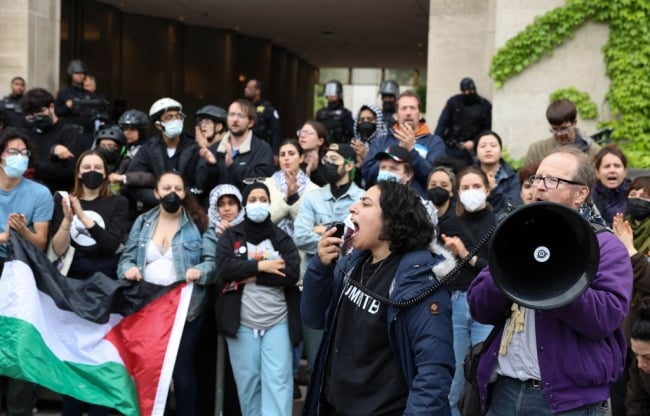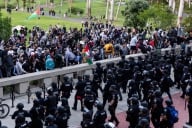You have /5 articles left.
Sign up for a free account or log in.

Pro-Palestinian protesters gathered at the University of Chicago on May 7.
Alex Wroblewski/AFP via Getty Images
The First Amendment applies to everyone within the United States, regardless of immigration or citizenship status. However, in practice, our immigration law renders some people extremely vulnerable when they seek to exercise their First Amendment free speech rights.
For example, an academic suspension will in many cases render an international student on a student visa deportable. U.S. Immigration and Customs Enforcement (ICE) has the discretion to determine whether to place a student who loses their immigration status in deportation proceedings, but discretion in the hands of ICE is often very problematic. For undocumented students, a conviction for a misdemeanor like trespassing or disturbing the peace can make it difficult to maintain even temporary legal protections from deportation. For legal permanent residents, an arrest, even without a conviction, can make naturalization difficult.
So, what does this mean for universities as it relates to the free speech rights of their noncitizen students?
Under the First Amendment, a public university has the right to impose reasonable “time, place and manner” restrictions on student protests. Private universities are not bound by the First Amendment but often choose to apply First Amendment principles to honor their commitments to free speech.
Universities, whether public or private, also have an obligation under Title VI to protect students from harassment that is severe enough to limit or deny a student’s ability to participate in or benefit from their educational program—for example, harassment that creates a hostile environment.
However, in meeting these obligations, universities need to make sure that they are not designing policies that are overbroad and that chill protected speech when applied to noncitizen students. Because college disciplinary actions or criminal law enforcement can trigger loss of immigration status or even deportation for noncitizens, a university might unintentionally or unwittingly put its noncitizen students in danger of “collateral consequences” that it did not consider or intend. If the university’s time, place and manner restrictions are too narrow, or if it engages in viewpoint-based discrimination to disproportionately punish speech it does not like, then it is at risk of chilling protected speech, especially by noncitizens.
This is not to say that noncitizen students should never be suspended, expelled, arrested or deported. If, for example, protesters are breaking a law that is consistently enforced—for example, by blocking a public road—then universities have the legal right to call the police and initiate suspension proceedings, provided their student handbooks define the offense, criteria for calling the police and maximum disciplinary penalty clearly in advance. Noncitizen students who participate in such protests can be understood to have assumed the risk.
However, in determining the proper course of action in less clear-cut circumstances, university administrators should consider collateral consequences. By analogy, in many states, prosecutors often use their discretion in the context of ordinary criminal conduct to ask for sentences that do not inadvertently trigger deportation in cases in which deportation would be a disproportionate consequence of the conviction. In addition, in 2019, former New York Governor Andrew Cuomo signed into law the “One Day to Protect New Yorkers Act,” which reduced the sentence for certain misdemeanor crimes in New York from 365 to 364 days to protect noncitizens from deportation.
When determining the proper course of action, universities that care about free speech should take care to consider similar provisions, both in the context of internal disciplinary proceedings and suspension decisions, and in the decisions to call the police. Universities and students should also be aware that once the police are called, the procedures are out of their control. A university cannot protect students from immigration enforcement actions, which often take on a life of their own. Moreover, universities do not control who will win the presidential election in November, which is likely to have serious implications for immigration enforcement. When tensions are high, it is easy for politicians to blame noncitizens, who cannot vote and who are often perceived as “outsiders,” and to discount their First Amendment rights.
Several major universities appear to have taken these factors into consideration, at least in part, by making sure that their disciplinary actions are designed in a way so as not to interfere with the visa status of international students. For example, after protesters and counterprotesters on Massachusetts Institute of Technology’s campus defied institutional policy last fall, President Sally Kornbluth stated that as an interim measure, suspensions would be limited to nonacademic activities given “serious concerns about collateral consequences for the students, such as visa issues …”
This is a reasonable and moderate way of lowering the temperature and ensuring penalties are measured and not disproportionate to the underlying violation. Other universities should follow this commonsense approach.








